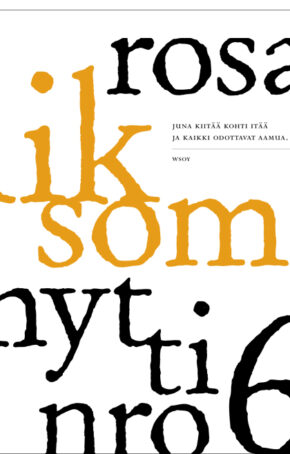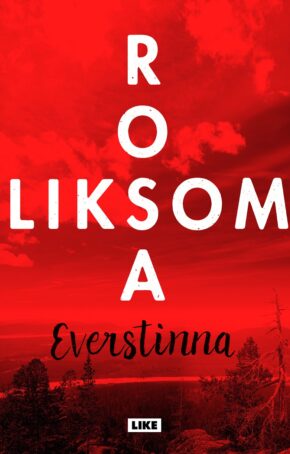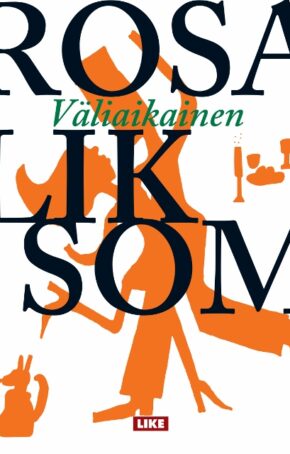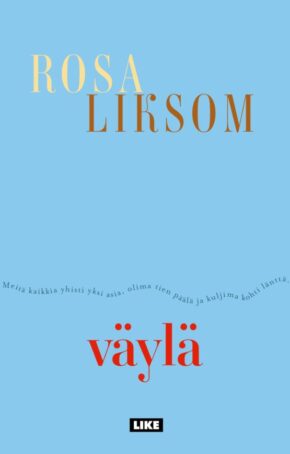Rosa Liksom
Rosa Liksom was born in Lapland, in the Meän language area, and moved to Helsinki at the age of seventeen. She spent a wild youth traveling the world before exploding onto the literary scene as one of the most original and influential Finnish writers of our time. Notably, she is also the first Finnish writer to publish works in Meänkieli, a regional dialect.
Beyond her writing, Rosa Liksom is a prominent cultural figure whose art, films, and performance pieces have been exhibited widely. In 2011, she was awarded the prestigious Finlandia Award for her novel Compartment No. 6 and in 2020 she was given the Swedish Academy’s Nordic Prize.
No one writes like Rosa Liksom – brutality and coarseness in one sentence is matched by breathtakingly beautiful observations about the natural world in the next. Travels filled with adventure draw a line through her oeuvre, the human condition as reflected through a landscape unfurling beyond a train window. The dichotomy of human depravity to natural wonder is a recurring theme in Liksom’s prose, and from her pen flows life and history in all its unapologetic, uncensored complexity.
Rosa Liksom is the pen name of Anni Ylävaara.
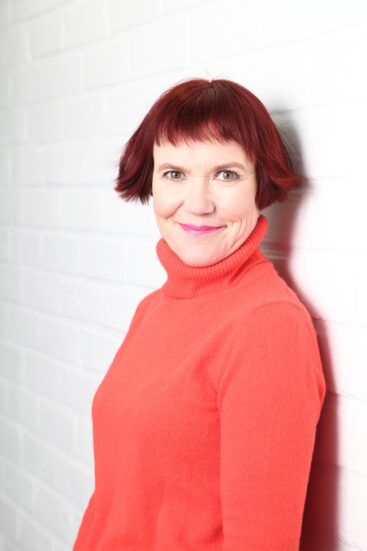
Reviews
“The River fascinates. The story is beautiful and touching, even fun in some places.”
Helsingin sanomat (FI)
“The River is the most rigorous realism in its style, reflecting a strong spark of hope.”
Satakunnan (FI)
“Liksom has written a captivating novel about people caught in the grip of war.”
Keskisuomalainen (FI)
“A northern masterpiece.”
Karjalainen (FI)
“Rosa Liksom has written one of her best novels to date.”
Lapin Kansa (FI)
“One of the most impressive parts of Liksom’s magnificent work is how it describes animals and the relationship between them and humans.”
Turun Sanomat (FI)
“The River is a great novel about humanity and especially the smallness of man.”
Me Nasiet (FI)
“Rosa Liksom’s new novel is incandescent with hope and life.”
Dagens Nyheter (SE)
“Sublimely written by Rosa Liksom about a girl, a herd of livestock, and The Lapland War. The River is painfully beautiful story about fleeing for your life.”
Västerviks Tidning (SE)
“While reading The River, you are asked the question: what is left when everything has been lost, when every single thing you hold dear has been taken from you? It’s impossible to answer, and at times the novel feels like slowly descending into the marsh, without having a single cloudberry to nibble on.”
Svenska Dagbladet (SE)
“The River is a powerful and anguished story that also manages to be filled with hope whilst depicting migration and survival. Subjects that unfortunately are still very present in our own time.”
Barometern (SE)
“The River is a documentary novel about the Lapland War. The novel transforms the filth and pain into potent poetry”
Sydsvenskan (SE)
“The depictions of nature are outstanding. You can feel the odor, the cold, the horror and the pain. The communion between humans and animals is told in the most beautiful way. […] Rosa Liksom has written a stunningly beautiful novel and I hope many people will read it and be just as moved as I was.”
Dast Magazine (SE)
“Rosa Liksom is one of the nordic authors that I always read with great joy.”
Vi Läser, Yukiko Duke (SE)
“With intimate knowledge, Rosa Liksom portrays the void that the final year of the [second] world war left in northern Finland. It is heartbreaking.”
Västerbottens-Kuriren (SE)
“The River is a novel that allows us to understand our own time, and with whose help we may be able to approach the innermost essence of life. It is, to say the least, magnificent.”
Upsala Nya Tidning (SE)
“Necessary reading. … Rosa Liksom has always written brutal, confident and utterly unsentimental prose, but here, when depicting people and animals during a chaotic escape, there is also room for both love and compassion.”
Kulturnytt (SE)
“Read The Colonel’s Wife and The River together, it illustrates how wondrously strong the human essence is – the longing, the dreams and the anxiety – even in a war zone.”
Aftonbladet (SE)
“The River is a powerful and painful – but also reassuring – story, about escape and survival. Topics that unfortunately posses a continued timeliness even today. In addition, Liksom sheds new light on important historical events that otherwise risk sliding into the darkness of oblivion.”
Norra Skåne (SE)
“The Finnish writer Rosa Liksom has an impeccable ability to merge sacred and profane, nature and culture, in her books.… Rosa Liksom has written a novel of equal significance to Swedish and Finnish historiography.”
Göteborgs Posten (SE)
“Liksom uses fiction to explore new life situations in a way that they become deeply embedded in your body. The result is a fierce and complex tale of futility.”
Jyllands-Posten (DK)
“The River is an incredibly thrilling story of someone on refuge, seen from a child’s point of view. The language is exuberantly poetic and intimate, the atrocities are described in a straight forward way and without sugarcoating. […] Finally, one of the most magical things about the book is that you get close to the very human mind of the cow, and I now understand how a cow can bring warmth and love to the abandoned.”
Litteratursiden (DK)
“A Finnish girl escapes from the Nazis in Rosa Liksom’s moving and painfully topical novel The River. […] Liksom writes in a raw, emotional and physical prose, without sentimentality.”
Kristeligt Dagblad (DK)
“Ms. Liksom is fearlessly good at portraying wicked men in all their moods and disguises. Her fantastic novel Compartment No. 6 features a similar, and similarly compelling, figure. […] the novel is strongest when it’s most direct about why people engage in evil: Because they enjoy it.”
The Wall Street Journal (US)
“An intimate investigation of authoritarianism.”
Kirkus Reviews (US)
“Liksom’s brief, haunting novel finds an elderly Finnish woman in her final days, reflecting on a lifetime as both a victim and perpetrator of cruelty… her descriptions of the torture she witnesses by the Nazis, and of that she endures by her husband, are made more chilling by their lack of sentimentality.”
Publishers Weekly (US)
“The Colonel’s Wife is a novel that is all the more thought-provoking and heart-rending in our current strained sociopolitical moment.”
Salon (US)
“The novel moves with a sprightly pace, and the rough Northern landscape is beautifully depicted. […] Liksom’s tale is a brilliantly drawn metaphor.”
PopMatters (US)
“A bold and violent history based on true events. […] it’s ballsy of Rosa to take on such a heavy story, filled to the brim with cruelty, violence amongst peers and fellow country men. She does so with wicked skills and humor, but she still manages to convey the gravity. Or more like the madness. There is no end to the cruelty. The language is edgy and brutal, and like always with Rosa, raw and filled with humor.”
Dagens Nyheter (SE)
“A frightening but important and compact novel about love and humiliation, exploitation, violence and powerlessness.”
Svenska Dagbladet (SE)
“Her boisterous and often ruthless characters are most often both themselves – real people – and symbols for something else, a spirit of the age, a country, a societal system. […] At the same time you can’t avoid being pulled in to Liksom’s evil fairytale world, thanks to her charming and quirky language that is brilliantly translated by Janina Orlov.”
Expressen (SE)
“The Colonel’s Wife points straight at our own contemporary moment. […] Rosa Liksom lets her Colonel’s wife tell her life story in a straight forward and direct way, filled with indulgences of different types: skinny-dipping in a forest mere, and making love in sphagnum moss; here speaks a human who has lived close to nature and feels just as much at home there as in her own body.”
SVT (SE)
“You cannot talk about Rosa Liksom’s books without mentioning the language. The reason not only being the direct and colorful prose, which is one of the leading qualities, but also what the language entails – an attitude toward life, a strategy for survival in an otherwise cruel and brutal reality. […] Like the raft that carries the main character across the dark water, Rosa Liksom’s perspicacious way of writing carries the reader over the abyss of mankind.”
Borås Tidning (SE)
“The history of Finland through the eyes of an ex-nazi, now elderly woman’s eyes. Painful, thought provoking and brutal in its language.”
BLT (SE)
“No one has ever told the 1900’s in Finland the way Rosa Liksom does it. Disrespectful, impudently and with an absurdly macabre humor.”
Länstidningen Östersund (SE)
“The idea for the book was birthed when she considered the fact that nazis and alt-right activists once again march the streets all over the world. What might still be alluring in those hostile ideologies? Rosa Liksom is known for her drastic humor and language, and that shines through in this novel as well, alongside the depictions of wrongdoings. But there is also a protruding poetic touch, especially apparent in the loving depictions of the nature in the Finnish Laplands.”
Internationalen (SE)
“What is this? A love story? An absurdism, a picaresque with such a foul mouth that anyone who is somewhat of a prude should chose other means of entertainment rather than this short novel of 175 pages. But still – so full of wordings that draws blood from the reader in-between caressing them as tender as only honeymooners can! The sun, the heat, the mosquitos, the birds return lawfully to the deserted land despite the ever present violence, and historically important people and events fall into the novel as easy as sprinkles on a cake.
The text does not seek the truth about time and space, but perhaps a possible truth about the vulnerability of the individual in what we call life.”
Tranås-Posten (SE)
“Through the old colonel’s wife’s last monologue or inner stream-of-conscience, Rosa Liksom portrays the history of war, the allies of Germany, the fear of the communists, the antisemitism, the fawners, the adjustments after the war. ‘That’s how I’ve always said it’, says the colonel’s wife in the end. ‘The joy of the past life is that it never comes back again.’ [Liksom] has written this novel in meänkieli, and with a prose as sweaty and dirty as war itself. It is horrifying from time to time, but you have no choice but to stick it through and read. And sometimes cool down in the marches of the wasteland.”
Sveriges Radio P1 (SE)
“The Colonel’s Wife is a story about incomprehensible love and submission. About fascistic instincts that reach full bloom, and about a frightening ability for adaption, both politically and privately. It is also a glimpse into a delight in wilderness, which transforms the moors and tundra of northern Finland into a realm of sensual adventure. Spun into a tight story about Finland’s catch 22 between Bolsheviks and Nazis in the first half of the 20th century, the result is a formidable literary feat. […] Conveyed in Rosa Liksom’s at once atmospheric and razor-sharp language, it is an alarmingly good read.”
Weekendavisen (DK)
“The novel centers its marital drama in an exploration of Finland’s violent early 20th century history. These two narrative devices work excellently, and create an outstanding, short and concentrated novel.”
Politiken (DK)
“A Five-star novel. […] Stories of relationship hell are nothing new, but The Colonel’s Wife isn’t just about marriage. It’s an attempt to understand the historic period from whence the colonel’s wife’s blind love, and the colonel’s sick love, draws its strength and destructiveness. In The Colonel’s Wife, Liksom examines the rise of fascism in Finland and Europe in the early 20th century, the coming of war, and the Finnish Whites’ fierce belief in Nazi Germany and its alliance with Finland, at an individual level.”
Aamulehti (FI)
“As a contrast to the horrors, Liksom’s language blooms more beautiful than ever.”
Helsingin Sanomat (FI)
“Liksom pulls in the reader with her unique style. There is no other like her. She answers well to her own statement, that literature is not only supposed to entertain but to deal with the basic questions of humanity.”
Uusi Suomi (FI)
“Keep in mind that Rosa Liksom is already a classic. It is she who brought our literature the lightning quick short story as well as idiomatic language. For a single writer, these are quite sufficient qualifications.”
Aamulehti (FI)
“Rosa Liksom has a fantastic ability to thoroughly master disparate genres: her novels and fragmentary prose form a large chapter in the history of modern form in Finnish literature.”
Helsingin Sanomat (FI)
“Liksom is the mother of Finnish flash fiction.”
Helsingin Sanomat (FI)
“In Passing Things, she writes about people on the fringes of society, the misfits that don’t really fit in anywhere. They have had their hearts broken and their dreams chipped, and they drown their sorrows in alcohol. But Rosa Liksom depicts them with love and warmth.”
Vi Läser (SE)
“Rosa Liksom has a corse sense of humor and it’s with this talent that she brings her at times atrocious stories full circle. […] As a whole, her flash story collection of freaky stories from life depicts a twisted mirror of society. The proper flank on one side and the miserably drunken one on the other. […] Rosa Liksom has a foul mouth and is more shameless than anyone else. She is not a showman first and foremost, even if she is irresistible. It’s for real. I believe her, believe she is telling the truth. And we all need to hear it.”
Dagens Nyheter (SE)
“In a society where its easy to be forgotten and left behind, were you can loose your footing and fall off course, it’s important that our literature does justice to life on the margins; that literature is not only about people from well-to-do city centers with minor problems. Rosa Liksom gives a voice to people who are rarely heard in the public room. […] She writes about society’s hinterlands without exoticizing it.”
Svenska Dagbladet (SE)
“With stories that move from modern Helsinki to the northern part of Finland, Rosa Liksom’s new book is a radiant document of its time, with insights that don’t have an expiration date.”
Litteratur Magazine (SE)
“Ms. Liksom conjures beauty from the ugliest of things. As she finds something wily and comical in the unforgettably horrible Ivanov, so she imbues the industrial wastelands with an inexplicable charm. […] What emerges is a twilight-hued elegy to the sickly last days of a wicked empire.”
Wall Street Journal (US)
“One of the book’s strengths is the many highly detailed, poetic descriptions of the mountains, snow-covered plains, and isolated, poverty-stricken towns. . . . An unsettling, politically charged parable about the proletariat’s Soviet Union on the eve of dissolution.”
Kirkus Reviews (US)
“[An] impressionistic travelogue of a novel.”
Publishers Weekly (US)
“[Compartment No. 6] seeks to bury Mother Russia and to praise her. It’s a delicate trick, but one that Finnish author Rosa Liksom pulls off with subtlety and skill. […] Liksom’s great achievement is that the portrait she paints is difficult for the reader to leave behind.”
Washington Independent Review of Books (US)
“Liksom is a master of controlled exaggeration. With a couple of carefully chosen brushstrokes, a mini-story, she is able to conjure up an entire human destiny.”
The Winnipeg Reviews (US)
“[Liksom’s] rapturous descriptions, filled with minutely observed details, mix together the beautiful and the banal, the ugly and the sublime. They are shot through with a sense of loss, and yet always seem to contain a hopeful motion.”
The Rumpus (US)
“Compartment No. 6 unfolds like a poem. . . . A lingering sense of the landscape and enduring survival remains.”
Star Tribune, Minneapolis (US)
“Brilliant and politically charged. […] Compartment No. 6 flows at a balladic clip, a political commentary to be endured, savored, and never forgotten.”
Malibu Magazine (US)
“[Compartment No. 6 is] a book to be read slowly, savoring the writing. The author gives us striking characters and vivid descriptions of early spring in what was the Soviet Union.”
Pioneer Press (US)
“A wonderful novel.”
Neue Zürcher Zeitung (CH)
“Rosa Liksom moves deftly between a myriad of subplots as they unfold in tandem to the novel’s central theme, in this way creating a powerful impression of the many torments that have shaped the destiny of the Russian people. Within the flowing descriptions each story lies enclosed within the next much as with Russian dolls, and the least is the most touching of all.”
La Liberté Suisse (FR)
“The literary composition alone is worth the money, the melodic, rhythmic language, compressed, poetical and replete with fragrance and color sensations. […] The girl and the man, this unlikely couple, accompany one another at the close across the plains as if progressing through a film by Andrej Tarkovskij.”
Svenska Dagbladet (SE)
“We’re very fond of Rosa Liksom’s multitalented authorship. The skillful jumps between jovial burlesque and a state of sedate melancholy. […] The people that don’t really fit in anywhere, which she depicts with such warmth, and humor.”
Vi Läser (SE)
“The novel is a pitch black accordion were every fold holds a tragicomic history. It drips with people’s destinies and crestfallen conversations. From this appear the counters of a country, a people and a time – so powerful that you believe you can hear and see it with your own eyes.”
Kulturnytt (SE)
“The outcome is both atmospheric and beautiful, an elegy to the Soviet Union and its people, the land where ‘unhappiness is perceived as happiness.”
Helsingborgs Dagblad (SE)
“All this black as night misery and despair are elevated by the writer into literature. She achieves this by means of the girl’s acute observations and sensitivity and the man’s luxuriating exaggeration and burlesque vehemence. […] The entire text is saturated with marked sensuality: the taste of buckwheat porridge, beetroots and rancid fat. And the human smells of sweat, fusel alcohol and poverty. […] And thus Compartment No 6 becomes a remarkable little book.”
Göteborgs-Posten (SE)
“The wild stories of the rough fellow passenger make this journey increasingly absurd, giddying and captivating. […] It is a stroke of genius to describe a country and give form to one’s mixed feelings for it through such a figure. To me, he is the incarnation of the human factor, which means that reason can never prevail, neither in planned nor in Capitalist economies.”
Aftonbladet (SE)
“The most fascinating thing about this short novel is Rosa Liksom’s masterly ability to visualize life and landscape. She is an artist, after all, and the imagery in the book is often very surprising and always loaded with meaning.”
Hufvudstadsbladet (FI)
Books
Awards
2023 – Winner of the Aleksis Kivi Award
2014 – Shortlisted for the Premio Strego Europeo
2013 – Shortlisted for Le Prix Médicis Étranger
2013 – Nominated for the Nordic Council Literature Award
2011- Winner of the Finlandia Award
